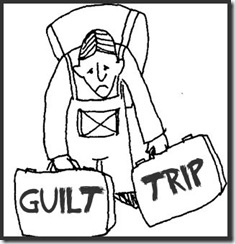Many of you suggested that the next hot topic be about the guilt felt when missing a workout.

Some of your questions were:
– If I am healthy and trying not to obsess about what I eat and my weight, why do I still feel guilty when missing a workout?
– How do I stop the guilt when I decide to take a day off?
– I am injured right now and I can’t exercise, how do I get rid of these guilty feelings?
[picture Source]
Of course, I always turn to empirical research to find out what answers various researchers have come up with!
Jonathan Mond, senior research officer in the department of psychological medicine at Canberra Hospital in Australia, conducted a study on exercise guilt on 230 women ages 18-45. The survey sought to examine the relationship between exercise and eating disorders. It also sought answers as to when exercise is bad for your health.
This is what he found:
- 70% of women were regular exercisers (10% exercised 10 hours per week or more)
- 12% exercised 1 hour a day
- The women who felt guilty after they missed a regular workout were also most likely to rate highly on measures for eating disorders
- 20% of Women who said that a very or extremely important reason for exercise was to "improve their body shape or tone" or to "improve their appearance or attractiveness" were also vulnerable to an eating disorder
- These women were also likely to have an unhealthy focus on appearance, restricting their intake, and to have dysfunctional attitudes to eating and weight. They were most likely to be rated as having a poor quality of life.
The goals below were not found to increase one’s risk for eating disorders:
- Goal of improved health (30%)
- Goal of improved fitness (22%)
- Weight loss (17%)
- For enjoyment (5%) WOW so low, eh???
Other feelings associated with missing exercise were the following:
- More than 11 per cent of women reported feeling upset most or every time they were unable to exercise
- 14 per cent always tried to make up for missed exercise by putting in more time.
But these feelings – as distinct from guilt – were not associated with eating disorders.
[Source]
So what does this research mean?
It appears that if your goals are primarily concerned about your appearance and body shape and you are experiencing lots of guilt over skipping a workout, you are at the highest risk for developing disordered eating or exercise habits.
If on the other hand, your exercise goals are centered around improving your health and endurance and you only experience a small amount of guilt after missing a workout, you are at much less risk for developing future problems.
I have also read other research that shows that when you put your focus on health over your body, you will enjoy the exercise more and do it more for pleasure!
Today’s questions:
- Do you have a lot of exercise guilt? When do you have the most guilt?
- When you miss a day of planned exercise how does it affect your entire day?
- What did you think about this research study? What surprised you or didn’t surprise you?
Later today I will be writing Part 2 of Exercise and Guilt! I will be talking about my own experience and what works for me!
Hope you have a wonderful Memorial Day!






Boy does this post resonate with me!!? Having dealt with an eating disorder for 15 years, I considered exercise as something I HAD to do (ie. If I didn’t exercise, I experienced extreme guilt and self-loathing which only exacerbated disordered eating).
I am at a stage with my recovery where I am taking on exercise again to improve my health and well-being and am finding the mindset of guilt for missed exercise an interesting challenge at times. I try to remind myself that rest days and/or missed exercise days can be “mental health” days or “self-care” days where I nuture and attend to my body, soul and mind wholeheartedly.
Thank you for such an engaging and thoughtful post! :D